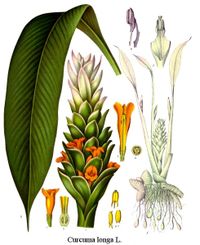| Turmeric | ||||||||||||||||
|---|---|---|---|---|---|---|---|---|---|---|---|---|---|---|---|---|

Curcuma longa
|
||||||||||||||||
| Scientific classification | ||||||||||||||||
|
||||||||||||||||
| Curcuma longa |
Turmeric (Curcuma longa, also called tumeric or kunyit in some Asian countries[1]) is a spice commonly used in curries and other South Asian cuisine. Its active ingredient is curcumin. It is a significant ingredient in most commercial curry powders. Turmeric is also used to give a yellow color to some prepared mustards, canned chicken broth, and other foods (often as a much cheaper replacement for saffron). It makes a poor fabric dye as it is not very lightfast (the degree to which a dye resists fading due to light exposure).
Turmeric, a representative of plant genus Curcuma, is a member of the ginger family, Zingiberaceae.
In Ayurvedic medicine, turmeric is thought to have many healthful properties. It is taken in some Asian countries as a dietary supplement, which allegedly helps with stomach problems and other ailments. It is popular as a tea in Okinawa, Japan. It is currently being investigated for possible benefits in Alzheimer's disease, cancer and liver disorders.
Sangli, a town in the southern part of the Indian state of Maharashtra, is the largest and most important trading centre for turmeric in Asia or perhaps in the entire world.
Contents |
Food additive

Turmeric (coded as E100 when used as a food additive) is used in product systems that are packaged to protect them from sunlight. The oleoresin is used for oil-containing products. The curcumin/polysorbate solution or curcumin powder dissolved in alcohol is used for water containing products. Over-colouring, such as in pickles, relishes and mustard, is sometimes used to compensate for fading.
Turmeric has found application in canned beverages, baked products, dairy products, ice cream, yogurts, yellow cakes, biscuits, popcorn-color, sweets, cake icings, cereals, sauces, gelatines, direct compression tablets, etc. In combination with Annatto (E160b) it has been used to colour cheeses, dry mixes, salad dressings, winter butter and margarine.
Medicine
The medicinal properties of the turmeric have for millennia been known to the ancient Indians and have been expounded in the Ayurvedic texts. It is only in recent years that Western scientists have increasingly recognised the medicinal properties of turmeric. According to a 2005 article in the Wall Street Journal titled, "Common Indian Spice Stirs Hope," research activity into curcumin, the active ingredient in turmeric, is exploding. Two hundred and fifty-six curcumin papers were published in the past year according to a search of the U.S. National Library of Medicine. Supplement sales have increased 35% from 2004, and the U.S. National Institutes of Health has four clinical trials underway to study curcumin treatment for pancreatic cancer, multiple myeloma, Alzheimer's, and colorectal cancer.
A 2004 UCLA-Veterans Affairs study involving genetically altered mice suggests that curcumin, the active ingredient in turmeric, might inhibit the accumulation of destructive beta amyloids in the brains of Alzheimer's disease patients and also break up existing plaques. "Curcumin has been used for thousands of years as a safe anti-inflammatory in a variety of ailments as part of Indian traditional medicine," Gregory Cole, Professor of medicine and neurology at the David Geffen School of Medicine at UCLA said.
Another 2004 study conducted at Yale University involved oral administration of circumin to mice homozygous for the most common allele implicated in cystic fibrosis. Treatment with circumin restored physiologically-relevant levels of protein function. [1]
Recent studies have shown that turmeric can be effective in fighting a number of STDs including chlamydia and gonorrhea.
Investigations into the low incidence of colorectal cancer amongst ethnic groups with a large intake of curries compared with the indigenous population have suggested that some active ingredients of turmeric may have anti-cancer properties.
Anti-tumoral effects against melanoma cells have been demonstrated [2].
Second-stage trials of a turmeric-based drug as a possible treatment for cancer are currently underway. However, according to recent research results [3], the component curcumin causes degradation of the human protein p53. p53 is responsible for removing damaged cells that are likely to become tumors, suggesting curcumin could accelerate tumor development.
Consuming large doses is not recommended in cases of gallstones, obstructive jaundice, acute bilious colic and toxic liver disorders.
Curry Pharmaceuticals, based in North Carolina, is studying the use of a curcumin cream for psoriasis treatment. Another company is already selling a cream based on curcumin called "Psoria-Gold," which shows anecdotal promise of treating the disease.
A recent study involving mice has shown that turmeric slows the spread of breast cancer into lungs and other body parts. Turmeric also enhances the effect of taxol in reducing metastasis of breast cancer [4].
It is also said that turmeric can strengthen the blood-brain barrier against attacks that result from auto-immune diseases (such as Multiple sclerosis).
In the November 2006 issue of Arthritis & Rheumatism, a study was published that showed the effectiveness of turmeric in the reduction of joint inflammation, and recommended clinical trials as a possible treatment for the alleviation of arthritis symptoms.[5]
Cosmetics
Turmeric is currently used in the formulation of some sun screens. Turmeric paste is used by Indian women to keep them free of superfluous hair.
The Government of Thailand is funding a project to extract and isolate tetrahydrocurcuminoids (THC) from turmeric. THCs are colorless compounds that might have antioxidant and skin lightening properties and might be used to treat skin inflammations, making these compounds useful in cosmetics formulations.
Chemistry
The active substance of turmeric is the polyphenol curcumin, also known as C.I. 75300, or Natural Yellow 3. Systematic chemical name is (1E,6E)-1,7-bis(4-hydroxy-3-methoxyphenyl)-1,6-heptadiene-3,5-dione. It can exist at least in two tautomeric forms, keto and enol. The keto form is preferred in solid phase and the enol form in solution.


Notes
- ^
Turmeric is known by different names in different
languages. Some examples include:
- "Arishina" in Kannada
- "Halad" in Marathi
- "Haldi" in Hindi and Gujarati.
- "Holood" in Bengali.
- "மஞ்சள்" (manjal) in Tamil.
- "Pasupu" in Telugu.
- "姜黄" (jiang huang) in Chinese.
External links
- Study suggest extract of a spice used in curry could help prevent rheumatoid arthritis and osteoporosis
- Plant Cultures: review of botany, history and uses
- Curcumin has potent anti-amyloidogenic effects for Alzheimer's beta-amyloid fibrils in vitro. (Ono et al, 2004)
- The curry spice curcumin reduces oxidative damage and amyloid pathology in an Alzheimer transgenic mouse. (Lim et al, 2001)
- Tumeric, the new active cosmetic ingredient - about the project funded by the Government of Thailand to extract THC from turmeric for cosmetics formulations
- Curcumin and turmeric delay streptozotocin-induced diabetic cataract in rats.
- Administration of curcumin prevents a decrease in liver function due to Selenium poisoning
- Curcumin is extremely effective in eliminating Neisseria gonorrhoeae cell adhesion in late-stage gonorrhoeae
- In vitro and in vivo anti-tumoral effect of curcumin against melanoma cells




 216.73.216.133
216.73.216.133 User Stats:
User Stats:
 Today: 0
Today: 0 Yesterday: 0
Yesterday: 0 This Month: 0
This Month: 0 This Year: 0
This Year: 0 Total Users: 117
Total Users: 117 New Members:
New Members:
 216.73.xxx.xxx
216.73.xxx.xxx
 Server Time:
Server Time: